Deck 2: Management Accounting: Cost Terms and Concepts
Question
Question
Question
Question
Question
Question
Question
Question
Question
Question
Question
Question
Question
Question
Question
Question
Question
Question
Question
Question
Question
Question
Question
Question
Question
Question
Question
Question
Question
Question
Question
Question
Question
Question
Question
Question
Question
Question
Question
Question
Question
Question
Question
Question
Question
Question
Question
Question
Question
Question
Question
Question
Question
Question
Question
Question
Question
Question
Question
Question
Question
Question
Question
Question
Question
Question
Question
Question
Question
Question
Question
Question
Question
Question
Question
Question
Question
Question
Question
Question

Unlock Deck
Sign up to unlock the cards in this deck!
Unlock Deck
Unlock Deck
1/87
Play
Full screen (f)
Deck 2: Management Accounting: Cost Terms and Concepts
1
Indirect costs:
A) cannot be traced to a particular cost object.
B) cannot be economically traced to a particular cost object.
C) are always variable costs.
D) are always fixed costs.
A) cannot be traced to a particular cost object.
B) cannot be economically traced to a particular cost object.
C) are always variable costs.
D) are always fixed costs.
B
2
Whether a cost is classified as direct or indirect will depend on:
A) the nature of the cost object.
B) whether the cost can be economically traced to the cost object.
C) whether the organisation is in a manufacturing or service industry
D) the nature of the cost object AND whether the cost can be economically traced to the cost object.
A) the nature of the cost object.
B) whether the cost can be economically traced to the cost object.
C) whether the organisation is in a manufacturing or service industry
D) the nature of the cost object AND whether the cost can be economically traced to the cost object.
D
3
Which of the following statements is false?
A) Costing is common to both traditional and modern management accounting.
B) Activity-based costing is common to both traditional and modern management accounting.
C) Performance measurement is common to both traditional and modern management accounting.
D) Modern performance measurement covers a range of critical success factors.
A) Costing is common to both traditional and modern management accounting.
B) Activity-based costing is common to both traditional and modern management accounting.
C) Performance measurement is common to both traditional and modern management accounting.
D) Modern performance measurement covers a range of critical success factors.
B
4
If production increases, variable cost will:
A) remain constant on a per unit basis.
B) increase by a variable amount.
C) vary on a per unit basis.
D) remain unchanged.
A) remain constant on a per unit basis.
B) increase by a variable amount.
C) vary on a per unit basis.
D) remain unchanged.

Unlock Deck
Unlock for access to all 87 flashcards in this deck.
Unlock Deck
k this deck
5
As activity level increases, total variable costs:
A) increase proportionately with activity.
B) decrease proportionately with activity.
C) increase by a fixed amount.
D) decrease by a fixed amount.
A) increase proportionately with activity.
B) decrease proportionately with activity.
C) increase by a fixed amount.
D) decrease by a fixed amount.

Unlock Deck
Unlock for access to all 87 flashcards in this deck.
Unlock Deck
k this deck
6
Which of the following statements is false?
I) Qualitative information is not relevant for planning purposes.
Ii) Production costs are important for planning purposes, but selling and administration costs are not.
Iii) Information on revenues is not important for planning purposes.
A) i
B) iii
C) i and iii
D) i, ii and iii
I) Qualitative information is not relevant for planning purposes.
Ii) Production costs are important for planning purposes, but selling and administration costs are not.
Iii) Information on revenues is not important for planning purposes.
A) i
B) iii
C) i and iii
D) i, ii and iii

Unlock Deck
Unlock for access to all 87 flashcards in this deck.
Unlock Deck
k this deck
7
Which of the following costs of a manufactured product is a period cost?
A) Direct material
B) Manufacturing overhead
C) Indirect material
D) Sales commission
A) Direct material
B) Manufacturing overhead
C) Indirect material
D) Sales commission

Unlock Deck
Unlock for access to all 87 flashcards in this deck.
Unlock Deck
k this deck
8
Which of the following is not an example of a manufacturing overhead?
A) Assembly line workers' wages
B) Factory rent
C) Depreciation of factory machinery
D) Factory lighting
A) Assembly line workers' wages
B) Factory rent
C) Depreciation of factory machinery
D) Factory lighting

Unlock Deck
Unlock for access to all 87 flashcards in this deck.
Unlock Deck
k this deck
9
Costs that can be traced to a particular cost object are called:
A) direct costs.
B) indirect costs.
C) product costs.
D) manufacturing costs.
A) direct costs.
B) indirect costs.
C) product costs.
D) manufacturing costs.

Unlock Deck
Unlock for access to all 87 flashcards in this deck.
Unlock Deck
k this deck
10
Which of the following statements is true? A cost is:
A) always an expense.
B) always an asset.
C) can be either an expense or an asset.
D) always a liability.
A) always an expense.
B) always an asset.
C) can be either an expense or an asset.
D) always a liability.

Unlock Deck
Unlock for access to all 87 flashcards in this deck.
Unlock Deck
k this deck
11
Variable costs:
A) vary indirectly with changes in activity level.
B) vary directly with changes in activity level.
C) vary on a per unit basis.
D) vary indirectly with changes in activity level AND vary on a per unit basis.
A) vary indirectly with changes in activity level.
B) vary directly with changes in activity level.
C) vary on a per unit basis.
D) vary indirectly with changes in activity level AND vary on a per unit basis.

Unlock Deck
Unlock for access to all 87 flashcards in this deck.
Unlock Deck
k this deck
12
Fixed costs:
A) vary directly with changes in activity level.
B) in total remain unchanged as activity levels change.
C) vary on a per unit basis.
D) B and C
A) vary directly with changes in activity level.
B) in total remain unchanged as activity levels change.
C) vary on a per unit basis.
D) B and C

Unlock Deck
Unlock for access to all 87 flashcards in this deck.
Unlock Deck
k this deck
13
As activity level decreases, unit variable cost:
A) increases proportionately with activity.
B) decreases proportionately with activity.
C) remains constant.
D) decreases by a fixed amount.
A) increases proportionately with activity.
B) decreases proportionately with activity.
C) remains constant.
D) decreases by a fixed amount.

Unlock Deck
Unlock for access to all 87 flashcards in this deck.
Unlock Deck
k this deck
14
Product costs are:
A) expended as they are incurred.
B) inventoriable costs.
C) period costs.
D) expended as they are incurred AND inventoriable costs.
A) expended as they are incurred.
B) inventoriable costs.
C) period costs.
D) expended as they are incurred AND inventoriable costs.

Unlock Deck
Unlock for access to all 87 flashcards in this deck.
Unlock Deck
k this deck
15
Costs that can be significantly influenced by a particular manager are:
A) product costs.
B) period costs.
C) controllable costs.
D) administrative costs.
A) product costs.
B) period costs.
C) controllable costs.
D) administrative costs.

Unlock Deck
Unlock for access to all 87 flashcards in this deck.
Unlock Deck
k this deck
16
Costs that are expended during the period in which the costs are incurred are called:
A) product costs.
B) inventoriable costs.
C) period costs.
D) indirect costs.
A) product costs.
B) inventoriable costs.
C) period costs.
D) indirect costs.

Unlock Deck
Unlock for access to all 87 flashcards in this deck.
Unlock Deck
k this deck
17
Which of the following statements is true?
A) The word cost has the same meaning in all situations in which it is used.
B) Cost data, once classified and recorded, can be used for any purpose.
C) Different cost concepts and classifications are used for different purposes.
D) None of the given answers
A) The word cost has the same meaning in all situations in which it is used.
B) Cost data, once classified and recorded, can be used for any purpose.
C) Different cost concepts and classifications are used for different purposes.
D) None of the given answers

Unlock Deck
Unlock for access to all 87 flashcards in this deck.
Unlock Deck
k this deck
18
Which is the correct order of cost incurrence in the value chain?
A) R&D, Product design, Manufacturing, Marketing, Distribution, Customer support
B) R&D, Product design, Customer support, Marketing, Distribution, Manufacturing
C) R&D, Product design, Manufacturing, Distribution, Customer support, Selling
D) R&D, Product design, Manufacturing, Distribution, Marketing, Customer support
A) R&D, Product design, Manufacturing, Marketing, Distribution, Customer support
B) R&D, Product design, Customer support, Marketing, Distribution, Manufacturing
C) R&D, Product design, Manufacturing, Distribution, Customer support, Selling
D) R&D, Product design, Manufacturing, Distribution, Marketing, Customer support

Unlock Deck
Unlock for access to all 87 flashcards in this deck.
Unlock Deck
k this deck
19
Which of the following is not a period cost?
A) Marketing costs
B) Administrative costs
C) Research and development
D) Factory overheads
A) Marketing costs
B) Administrative costs
C) Research and development
D) Factory overheads

Unlock Deck
Unlock for access to all 87 flashcards in this deck.
Unlock Deck
k this deck
20
Which of the following is not an example of a variable cost?
A) Straight-line depreciation on a machine expected to last 5 years.
B) Wages paid to assembly line workers at a local manufacturing plant.
C) Timber used to make outdoor furniture.
D) Commissions paid to sales personnel.
A) Straight-line depreciation on a machine expected to last 5 years.
B) Wages paid to assembly line workers at a local manufacturing plant.
C) Timber used to make outdoor furniture.
D) Commissions paid to sales personnel.

Unlock Deck
Unlock for access to all 87 flashcards in this deck.
Unlock Deck
k this deck
21
Refer to the following data. 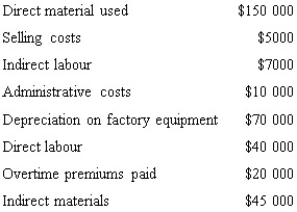
The non-manufacturing costs are:
A) $15 000
B) $70 000
C) $182 000
D) $372 000

The non-manufacturing costs are:
A) $15 000
B) $70 000
C) $182 000
D) $372 000

Unlock Deck
Unlock for access to all 87 flashcards in this deck.
Unlock Deck
k this deck
22
The Casual Furniture Company manufactures outdoor furniture and incurred the following costs during the month of January: 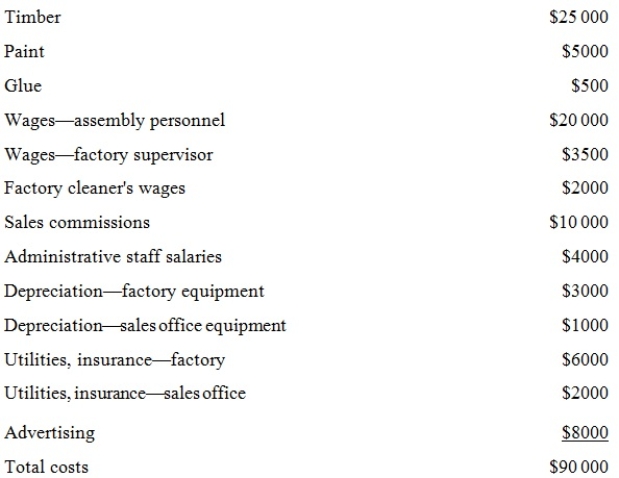
The manufacturing overhead is:
A) $14 500.
B) $15 000.
C) $9500.
D) $9000.

The manufacturing overhead is:
A) $14 500.
B) $15 000.
C) $9500.
D) $9000.

Unlock Deck
Unlock for access to all 87 flashcards in this deck.
Unlock Deck
k this deck
23
Indirect material, indirect labour and other manufacturing costs that are neither direct labour nor direct material costs are classified as:
A) manufacturing overhead.
B) product costs.
C) prime costs.
D) manufacturing overhead AND product costs.
A) manufacturing overhead.
B) product costs.
C) prime costs.
D) manufacturing overhead AND product costs.

Unlock Deck
Unlock for access to all 87 flashcards in this deck.
Unlock Deck
k this deck
24
Cost of goods purchased includes the:
A) purchase cost.
B) transportation inward cost.
C) storage cost.
D) purchase cost AND transportation inward cost.
A) purchase cost.
B) transportation inward cost.
C) storage cost.
D) purchase cost AND transportation inward cost.

Unlock Deck
Unlock for access to all 87 flashcards in this deck.
Unlock Deck
k this deck
25
Depreciation of factory equipment would be classified as:
A) indirect material.
B) indirect labour.
C) manufacturing overhead.
D) a sundry expense.
A) indirect material.
B) indirect labour.
C) manufacturing overhead.
D) a sundry expense.

Unlock Deck
Unlock for access to all 87 flashcards in this deck.
Unlock Deck
k this deck
26
Product costs comprise:
A) direct materials, direct labour and manufacturing overhead.
B) direct materials and manufacturing overhead.
C) direct labour and manufacturing overhead.
D) direct materials and direct labour.
A) direct materials, direct labour and manufacturing overhead.
B) direct materials and manufacturing overhead.
C) direct labour and manufacturing overhead.
D) direct materials and direct labour.

Unlock Deck
Unlock for access to all 87 flashcards in this deck.
Unlock Deck
k this deck
27
Indirect materials include:
A) materials that are incorporated into the finished product.
B) materials required for the production process, which do not become an integral part of the finished product.
C) direct materials that are so insignificant in cost that it becomes unimportant to trace their costs to specific products.
D) materials required for the production process, which do not become an integral part of the finished product AND direct materials that are so insignificant in cost that it becomes unimportant to trace their costs to specific products.
A) materials that are incorporated into the finished product.
B) materials required for the production process, which do not become an integral part of the finished product.
C) direct materials that are so insignificant in cost that it becomes unimportant to trace their costs to specific products.
D) materials required for the production process, which do not become an integral part of the finished product AND direct materials that are so insignificant in cost that it becomes unimportant to trace their costs to specific products.

Unlock Deck
Unlock for access to all 87 flashcards in this deck.
Unlock Deck
k this deck
28
Refer to the following data. 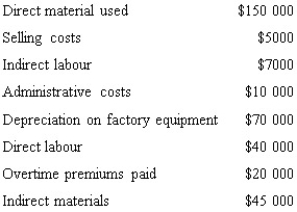
The prime costs are:
A) $190 000.
B) $40 000.
C) $150 000.
D) $142 000.

The prime costs are:
A) $190 000.
B) $40 000.
C) $150 000.
D) $142 000.

Unlock Deck
Unlock for access to all 87 flashcards in this deck.
Unlock Deck
k this deck
29
The Casual Furniture Company manufactures outdoor furniture and incurred the following costs during the month of January: 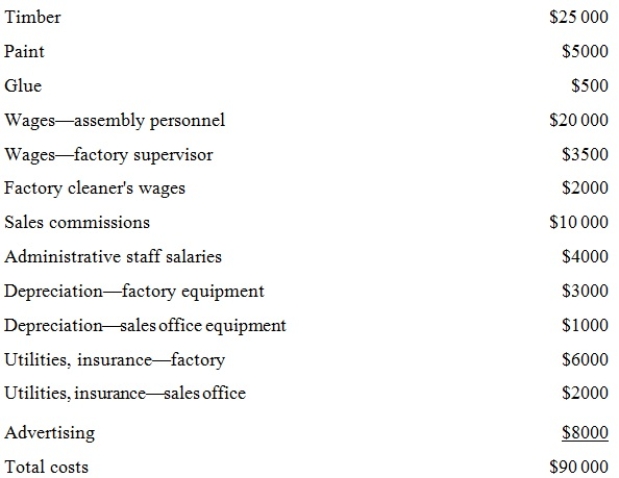
The prime costs are:
A) $30 000.
B) $50 000.
C) $65 000.
D) $50 500.

The prime costs are:
A) $30 000.
B) $50 000.
C) $65 000.
D) $50 500.

Unlock Deck
Unlock for access to all 87 flashcards in this deck.
Unlock Deck
k this deck
30
Idle time is:
A) frequently an avoidable cost.
B) classified as overhead.
C) caused by events such as equipment breakdown and new set-ups of production runs.
D) All of the given answers.
A) frequently an avoidable cost.
B) classified as overhead.
C) caused by events such as equipment breakdown and new set-ups of production runs.
D) All of the given answers.

Unlock Deck
Unlock for access to all 87 flashcards in this deck.
Unlock Deck
k this deck
31
On-costs on direct labour are classified as:
A) direct labour.
B) indirect labour.
C) manufacturing overhead.
D) either direct labour or indirect labour depending on the decision made by the firm.
A) direct labour.
B) indirect labour.
C) manufacturing overhead.
D) either direct labour or indirect labour depending on the decision made by the firm.

Unlock Deck
Unlock for access to all 87 flashcards in this deck.
Unlock Deck
k this deck
32
Refer to the following data. 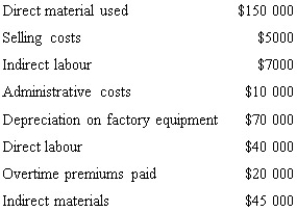
The period costs are:
A) $15 000
B) $20 000
C) $190 000
D) $372 000

The period costs are:
A) $15 000
B) $20 000
C) $190 000
D) $372 000

Unlock Deck
Unlock for access to all 87 flashcards in this deck.
Unlock Deck
k this deck
33
Unless overtime and idle time are caused by a particular job, they are treated as:
A) a part of direct labour expense.
B) a part of manufacturing overhead.
C) associated with a particular product.
D) a part of manufacturing overhead AND associated with a particular product.
A) a part of direct labour expense.
B) a part of manufacturing overhead.
C) associated with a particular product.
D) a part of manufacturing overhead AND associated with a particular product.

Unlock Deck
Unlock for access to all 87 flashcards in this deck.
Unlock Deck
k this deck
34
The Casual Furniture Company manufactures outdoor furniture and incurred the following costs during the month of January: 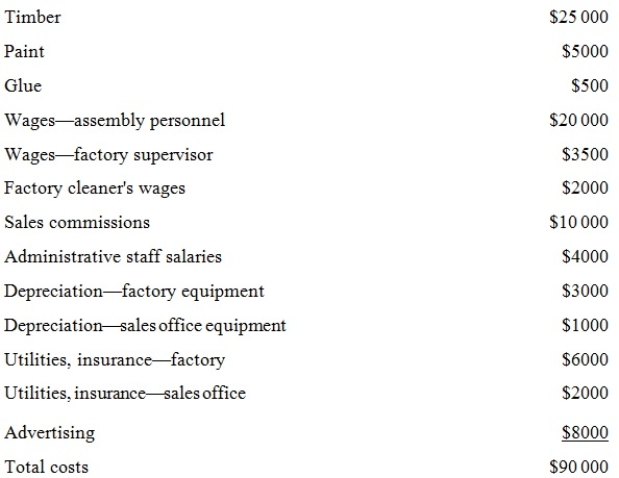
The conversion costs are:
A) $34 500.
B) $29 500.
C) $20 000.
D) $35 000.

The conversion costs are:
A) $34 500.
B) $29 500.
C) $20 000.
D) $35 000.

Unlock Deck
Unlock for access to all 87 flashcards in this deck.
Unlock Deck
k this deck
35
The flow of manufacturing costs through the system is:
A) raw materials inventory; work in process inventory; finished goods inventory; cost of goods sold.
B) raw materials inventory; work in process inventory; cost of goods sold; finished goods inventory.
C) work in process inventory; raw materials inventory; finished goods inventory; cost of goods sold.
D) raw materials inventory; finished goods inventory; work in process inventory; cost of goods sold.
A) raw materials inventory; work in process inventory; finished goods inventory; cost of goods sold.
B) raw materials inventory; work in process inventory; cost of goods sold; finished goods inventory.
C) work in process inventory; raw materials inventory; finished goods inventory; cost of goods sold.
D) raw materials inventory; finished goods inventory; work in process inventory; cost of goods sold.

Unlock Deck
Unlock for access to all 87 flashcards in this deck.
Unlock Deck
k this deck
36
Refer to the following data. 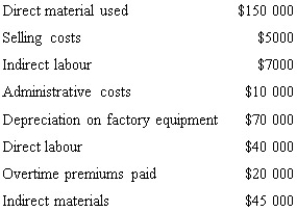
The product costs are:
A) $15 000
B) $182 000
C) $190 000
D) $332 000

The product costs are:
A) $15 000
B) $182 000
C) $190 000
D) $332 000

Unlock Deck
Unlock for access to all 87 flashcards in this deck.
Unlock Deck
k this deck
37
In the manufacturing firm, inventories consist of:
A) raw materials, cost of goods manufactured during the period and finished goods.
B) raw materials, work in process and finished goods.
C) raw materials, finished goods and cost of goods sold.
D) cost of goods manufactured and cost of goods sold.
A) raw materials, cost of goods manufactured during the period and finished goods.
B) raw materials, work in process and finished goods.
C) raw materials, finished goods and cost of goods sold.
D) cost of goods manufactured and cost of goods sold.

Unlock Deck
Unlock for access to all 87 flashcards in this deck.
Unlock Deck
k this deck
38
The Casual Furniture Company manufactures outdoor furniture and incurred the following costs during the month of January: 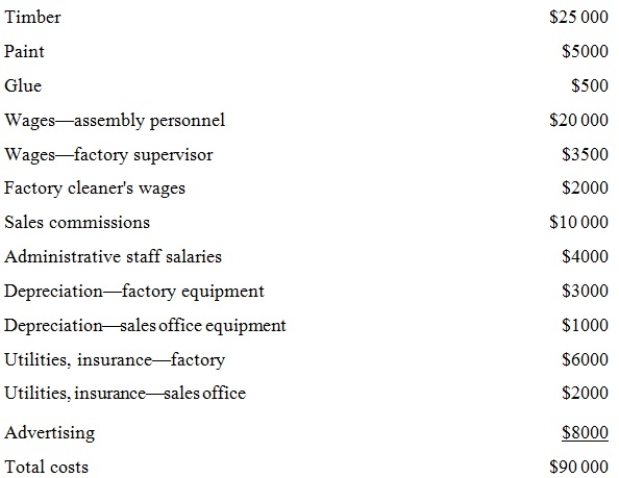
The product costs are:
A) $90 000.
B) $83 000.
C) $65 000.
D) $63 000.

The product costs are:
A) $90 000.
B) $83 000.
C) $65 000.
D) $63 000.

Unlock Deck
Unlock for access to all 87 flashcards in this deck.
Unlock Deck
k this deck
39
The Casual Furniture Company manufactures outdoor furniture and incurred the following costs during the month of January: 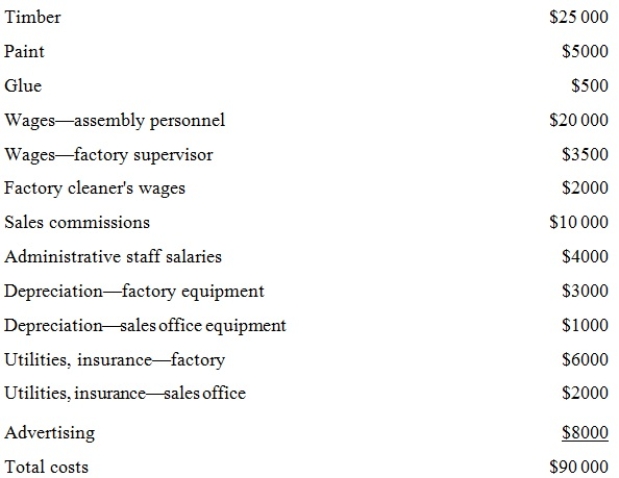
The period costs are:
A) $0.
B) $7000.
C) $25 000.
D) $30 500.

The period costs are:
A) $0.
B) $7000.
C) $25 000.
D) $30 500.

Unlock Deck
Unlock for access to all 87 flashcards in this deck.
Unlock Deck
k this deck
40
Refer to the following data. 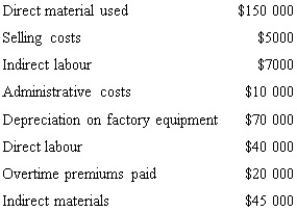
The conversion costs are:
A) $150 000.
B) $142 000.
C) $182 000.
D) $190 000.

The conversion costs are:
A) $150 000.
B) $142 000.
C) $182 000.
D) $190 000.

Unlock Deck
Unlock for access to all 87 flashcards in this deck.
Unlock Deck
k this deck
41
Which of the following terms accurately describes all three manufacturing costs (i.e. direct materials, direct labour and manufacturing overhead)?
A) Product costs
B) Variable costs
C) Direct costs
D) Both direct costs and product costs
A) Product costs
B) Variable costs
C) Direct costs
D) Both direct costs and product costs

Unlock Deck
Unlock for access to all 87 flashcards in this deck.
Unlock Deck
k this deck
42
Eldervale Winery is a producer of premium wine. Which of the following is NOT an example of a downstream cost?
A) The costs associated with random quality check during the wine production process
B) The costs associated with the sales team travelling to a wine show to promote Eldervale wine
C) The costs associated with delivering wine to customers
D) The costs associated with answering customer inquiries on the differences between wine varieties
A) The costs associated with random quality check during the wine production process
B) The costs associated with the sales team travelling to a wine show to promote Eldervale wine
C) The costs associated with delivering wine to customers
D) The costs associated with answering customer inquiries on the differences between wine varieties

Unlock Deck
Unlock for access to all 87 flashcards in this deck.
Unlock Deck
k this deck
43
Eldervale Winery is a producer of premium wine. Which of the following is an example of a downstream cost?
A) The costs associated with storing wine for customers
B) The costs associated with designing the labels on a wine bottle
C) The costs associated with researching a new variety of grapes
D) The costs associated with quality testing
A) The costs associated with storing wine for customers
B) The costs associated with designing the labels on a wine bottle
C) The costs associated with researching a new variety of grapes
D) The costs associated with quality testing

Unlock Deck
Unlock for access to all 87 flashcards in this deck.
Unlock Deck
k this deck
44
Which of the following statements correctly completes this sentence? 'For a firm that manufactures floor tiles, when the tiles are completed and ready for sale ....'
A) there is no change in the value of the firm's assets.
B) the firm's total assets are decreased.
C) the firm's total cost of the goods sold is increased.
D) the firm's work in process inventory is increased.
A) there is no change in the value of the firm's assets.
B) the firm's total assets are decreased.
C) the firm's total cost of the goods sold is increased.
D) the firm's work in process inventory is increased.

Unlock Deck
Unlock for access to all 87 flashcards in this deck.
Unlock Deck
k this deck
45
Which of the following statements is correct in relation to determining whether a cost is direct or indirect?
A) The wider the definition of the cost object, the more costs that will be indirect costs.
B) The number of cost items that can be classified as direct costs does not depend on the definition of cost objects.
C) The narrower the definition of the cost object, the more costs that will be direct costs.
D) The wider the definition of the cost object, the more costs that will be direct costs.
A) The wider the definition of the cost object, the more costs that will be indirect costs.
B) The number of cost items that can be classified as direct costs does not depend on the definition of cost objects.
C) The narrower the definition of the cost object, the more costs that will be direct costs.
D) The wider the definition of the cost object, the more costs that will be direct costs.

Unlock Deck
Unlock for access to all 87 flashcards in this deck.
Unlock Deck
k this deck
46
Eldervale Winery is a producer of premium wine. Which of the following is NOT an example of an upstream cost?
A) The costs associated with marketing a new range of wine in an international trade fair
B) The costs associated with researching a new variety of grapes
C) The costs associated with testing a new wine barrel
D) The costs associated with negotiating with and managing the farmers who supply the grapes
A) The costs associated with marketing a new range of wine in an international trade fair
B) The costs associated with researching a new variety of grapes
C) The costs associated with testing a new wine barrel
D) The costs associated with negotiating with and managing the farmers who supply the grapes

Unlock Deck
Unlock for access to all 87 flashcards in this deck.
Unlock Deck
k this deck
47
Eldervale Winery is a producer of premium wine. Which of the following is an example of an upstream cost?
A) The costs associated with storing wine barrels.
B) The costs associated with designing the labels on a wine bottle.
C) The costs associated with delivering products to customers.
D) The costs associated with quality inspection.
A) The costs associated with storing wine barrels.
B) The costs associated with designing the labels on a wine bottle.
C) The costs associated with delivering products to customers.
D) The costs associated with quality inspection.

Unlock Deck
Unlock for access to all 87 flashcards in this deck.
Unlock Deck
k this deck
48
Traditional cost management systems use production volume as the measure of activity. Modern systems might use which of the following as activity measures?
A) Number of batches
B) Number of customers
C) Number of product lines
D) All of the given answers
A) Number of batches
B) Number of customers
C) Number of product lines
D) All of the given answers

Unlock Deck
Unlock for access to all 87 flashcards in this deck.
Unlock Deck
k this deck
49
Work in process inventories are composed of:
A) direct materials.
B) direct labour.
C) manufacturing overhead.
D) All of the given answers
A) direct materials.
B) direct labour.
C) manufacturing overhead.
D) All of the given answers

Unlock Deck
Unlock for access to all 87 flashcards in this deck.
Unlock Deck
k this deck
50
Mydas Ltd operates a large factory which manufactures three types of motor vehicles, including family cars, sports cars and motorcycles. If the cost object is a motorcycle, which of the following is a direct cost?
A) The costs of wheels on the motorcycle
B) The salary of the factory general manager
C) The salary of the factory quality inspector
D) The windscreen wipers on a family car
A) The costs of wheels on the motorcycle
B) The salary of the factory general manager
C) The salary of the factory quality inspector
D) The windscreen wipers on a family car

Unlock Deck
Unlock for access to all 87 flashcards in this deck.
Unlock Deck
k this deck
51
Fairchild Pty Ltd began April with a finished goods inventory of $25 000. The cost of goods manufactured during the month was $40 000 and the cost of goods sold during April was $50 000.
The inventory remaining in finished goods at the end of April was:
A) $35 000.
B) $25 000.
C) $20 000.
D) $15 000.
The inventory remaining in finished goods at the end of April was:
A) $35 000.
B) $25 000.
C) $20 000.
D) $15 000.

Unlock Deck
Unlock for access to all 87 flashcards in this deck.
Unlock Deck
k this deck
52
Barrister and Company began July with a finished goods inventory of $10 000. The cost of goods manufactured during the month was $85 000 and the ending finished goods inventory was $20 000.
The cost of goods sold during July was:
A) $55 000.
B) $75 000.
C) $95 000.
D) $105 000.
The cost of goods sold during July was:
A) $55 000.
B) $75 000.
C) $95 000.
D) $105 000.

Unlock Deck
Unlock for access to all 87 flashcards in this deck.
Unlock Deck
k this deck
53
With respect to the flow of manufacturing costs through the accounts, what does the ending balance of work in process account show?
A) The total costs for completed jobs.
B) The total costs for incomplete jobs.
C) The amount of costs incurred for the period.
D) The amount of cost to be transferred to cost of goods sold.
A) The total costs for completed jobs.
B) The total costs for incomplete jobs.
C) The amount of costs incurred for the period.
D) The amount of cost to be transferred to cost of goods sold.

Unlock Deck
Unlock for access to all 87 flashcards in this deck.
Unlock Deck
k this deck
54
Mydas Ltd operates a large factory which manufactures three types of motor vehicles, including family sedans, sports cars and motorcycles. If the cost object is a family car, which of the following is an indirect cost?
A) The costs of wheels on the motorcycle
B) The salary of the factory general manager
C) The wages of the quality inspector whose job is to inspect each family car
D) The windscreen wipers on a family car
A) The costs of wheels on the motorcycle
B) The salary of the factory general manager
C) The wages of the quality inspector whose job is to inspect each family car
D) The windscreen wipers on a family car

Unlock Deck
Unlock for access to all 87 flashcards in this deck.
Unlock Deck
k this deck
55
To calculate the cost of goods sold during the period, you would use which of the following equations?
A) Beginning finished goods + cost of goods manufactured + ending finished goods
B) Ending finished goods + cost of goods manufactured - beginning finished goods
C) Beginning finished goods + cost of goods manufactured - ending finished goods
D) Beginning finished goods + ending finished goods - cost of goods manufactured
A) Beginning finished goods + cost of goods manufactured + ending finished goods
B) Ending finished goods + cost of goods manufactured - beginning finished goods
C) Beginning finished goods + cost of goods manufactured - ending finished goods
D) Beginning finished goods + ending finished goods - cost of goods manufactured

Unlock Deck
Unlock for access to all 87 flashcards in this deck.
Unlock Deck
k this deck
56
As manufacturing companies become more automated, their cost structure will change so that:
A) variable costs increase, fixed costs decrease.
B) variable costs decrease, fixed costs decrease.
C) variable costs decrease, fixed costs increase.
D) there is no change in the ratio of variable to fixed costs.
A) variable costs increase, fixed costs decrease.
B) variable costs decrease, fixed costs decrease.
C) variable costs decrease, fixed costs increase.
D) there is no change in the ratio of variable to fixed costs.

Unlock Deck
Unlock for access to all 87 flashcards in this deck.
Unlock Deck
k this deck
57
Barrett Industries began the month of June with a finished goods inventory of $15 000. The finished goods inventory at the end of June was $10 000 and the cost of goods sold during the month was $20 000.
The cost of goods manufactured during the month of June was:
A) $15 000
B) $25 000
C) $20 000
D) $5000
The cost of goods manufactured during the month of June was:
A) $15 000
B) $25 000
C) $20 000
D) $5000

Unlock Deck
Unlock for access to all 87 flashcards in this deck.
Unlock Deck
k this deck
58
Choose the statement that best completes this sentence: 'Traditional management accounting focuses on ....'
A) budgeting systems, financial performance measures and cost control.
B) financial performance measures, external reporting and cost elimination.
C) non-financial performance measures, external reporting and cost control.
D) external reporting, labour-related activity measures and cost elimination.
A) budgeting systems, financial performance measures and cost control.
B) financial performance measures, external reporting and cost elimination.
C) non-financial performance measures, external reporting and cost control.
D) external reporting, labour-related activity measures and cost elimination.

Unlock Deck
Unlock for access to all 87 flashcards in this deck.
Unlock Deck
k this deck
59
Lenco Industries has cost of goods manufactured of $65 000 in May. The finished goods inventory at the end of May was $20 000 and the cost of goods sold during May was $75 000.
The inventory in finished goods at the beginning of May was:
A) $5000.
B) $30 000.
C) $10 000.
D) $20 000.
The inventory in finished goods at the beginning of May was:
A) $5000.
B) $30 000.
C) $10 000.
D) $20 000.

Unlock Deck
Unlock for access to all 87 flashcards in this deck.
Unlock Deck
k this deck
60
The monthly cost of renting manufacturing equipment is:
A) part of conversion cost and a period cost.
B) part of prime cost and an inventoriable cost.
C) part of prime cost and a period cost.
D) part of conversion cost and an inventoriable cost.
A) part of conversion cost and a period cost.
B) part of prime cost and an inventoriable cost.
C) part of prime cost and a period cost.
D) part of conversion cost and an inventoriable cost.

Unlock Deck
Unlock for access to all 87 flashcards in this deck.
Unlock Deck
k this deck
61
Kevin Smith is the production manager of Mydas Ltd, a company that manufactures a range of motor vehicles. His role includes overseeing the entire production process of Mydas Ltd's three product lines: family cars, sports cars, and motor cycles. Once completed, all the cars are shipped within Australia and to China and Korea by the company's shipping and transportation department.
Identify two examples of controllable costs and two examples of uncontrollable costs for Kevin. Explain your answer.
Identify two examples of controllable costs and two examples of uncontrollable costs for Kevin. Explain your answer.

Unlock Deck
Unlock for access to all 87 flashcards in this deck.
Unlock Deck
k this deck
62
Classifying responsibility centre costs as controllable or uncontrollable can enhance:
A) performance evaluation.
B) cost accounting.
C) budget reporting.
D) financial reporting.
A) performance evaluation.
B) cost accounting.
C) budget reporting.
D) financial reporting.

Unlock Deck
Unlock for access to all 87 flashcards in this deck.
Unlock Deck
k this deck
63
Costs that managers cannot significantly influence are classified as uncontrollable costs.

Unlock Deck
Unlock for access to all 87 flashcards in this deck.
Unlock Deck
k this deck
64
Sally Strong is the production manager of Eldervale Winery. Her role includes overseeing the production and bottling processes of Eldervale Winery's three product lines: sparkling wine, red wine and white wine. Which of the following is most likely to be an example of a controllable cost for Sally?
A) The costs associated with bottling wine
B) The costs associated with advertising Eldervale wine on national TV
C) The costs associated with liaising with distributors to export wine to China
D) The costs associated with obtaining finance from banks
A) The costs associated with bottling wine
B) The costs associated with advertising Eldervale wine on national TV
C) The costs associated with liaising with distributors to export wine to China
D) The costs associated with obtaining finance from banks

Unlock Deck
Unlock for access to all 87 flashcards in this deck.
Unlock Deck
k this deck
65
When raw materials are purchased by a manufacturer, those costs will be recorded in the general ledger as:
A) cost of goods sold.
B) manufacturing costs.
C) inventory.
D) conversion costs.
A) cost of goods sold.
B) manufacturing costs.
C) inventory.
D) conversion costs.

Unlock Deck
Unlock for access to all 87 flashcards in this deck.
Unlock Deck
k this deck
66
Direct and indirect cost classification is based on cost behaviour in relation to changes in the level of activity.

Unlock Deck
Unlock for access to all 87 flashcards in this deck.
Unlock Deck
k this deck
67
In the short term, which of the following costs would be classified as uncontrollable?
A) Raw materials
B) Stationery expenses
C) Loan interest
D) Entertainment expenses
A) Raw materials
B) Stationery expenses
C) Loan interest
D) Entertainment expenses

Unlock Deck
Unlock for access to all 87 flashcards in this deck.
Unlock Deck
k this deck
68
Components of a management accounting system
Management accounting systems are made up of four interrelated systems. Identify those four systems, explain their function and describe how they collectively assist management in their decision making.
Management accounting systems are made up of four interrelated systems. Identify those four systems, explain their function and describe how they collectively assist management in their decision making.

Unlock Deck
Unlock for access to all 87 flashcards in this deck.
Unlock Deck
k this deck
69
A courier company may view kilometres driven as a possible cost driver.

Unlock Deck
Unlock for access to all 87 flashcards in this deck.
Unlock Deck
k this deck
70
A responsibility centre:
A) refers to a unit of business where all the associated costs are considered as 'direct costs'.
B) refers to a unit of a business where the manager is held accountable for activities and performance.
C) is another term for 'business division'.
D) is a term applicable only to manufacturing companies.
A) refers to a unit of business where all the associated costs are considered as 'direct costs'.
B) refers to a unit of a business where the manager is held accountable for activities and performance.
C) is another term for 'business division'.
D) is a term applicable only to manufacturing companies.

Unlock Deck
Unlock for access to all 87 flashcards in this deck.
Unlock Deck
k this deck
71
Resources that are surrendered to achieve a particular objective in business are known as:
A) resources.
B) expenses.
C) assets.
D) costs.
A) resources.
B) expenses.
C) assets.
D) costs.

Unlock Deck
Unlock for access to all 87 flashcards in this deck.
Unlock Deck
k this deck
72
'Prime costs' is the term given to direct labour and direct materials, as they are the major costs directly associated with the manufacture of a product.

Unlock Deck
Unlock for access to all 87 flashcards in this deck.
Unlock Deck
k this deck
73
Production costs assist management to determine:
A) sales revenue.
B) cost of goods sold.
C) gross profit.
D) net profit.
A) sales revenue.
B) cost of goods sold.
C) gross profit.
D) net profit.

Unlock Deck
Unlock for access to all 87 flashcards in this deck.
Unlock Deck
k this deck
74
In relation to the activities of the value chain of a manufacturing company, primary processes include accounting and legal activities.

Unlock Deck
Unlock for access to all 87 flashcards in this deck.
Unlock Deck
k this deck
75
Describe how the value chain can help a business analyse its cost structures. What is meant by upstream costs and downstream costs? Give examples.

Unlock Deck
Unlock for access to all 87 flashcards in this deck.
Unlock Deck
k this deck
76
Sally Strong is the production manager of Eldervale Winery. Her role includes overseeing the production and bottling processes of Eldervale Winery's three product lines: sparkling wine, red wine and white wine. Which of the following is most likely an example of an uncontrollable cost for Sally?
A) The costs associated with bottling wine
B) The costs associated with advertising Eldervale wine on national TV
C) The costs associated with moving wine from the barrels to the bottling area
D) The costs associated with quality testing
A) The costs associated with bottling wine
B) The costs associated with advertising Eldervale wine on national TV
C) The costs associated with moving wine from the barrels to the bottling area
D) The costs associated with quality testing

Unlock Deck
Unlock for access to all 87 flashcards in this deck.
Unlock Deck
k this deck
77
Manufacturing costs
Manufacturing costs are costs that are incurred within the factory area. Describe the three components of manufacturing costs. Identify the costs that might be incurred in the manufacture of a Levi Strauss shirt.
Manufacturing costs are costs that are incurred within the factory area. Describe the three components of manufacturing costs. Identify the costs that might be incurred in the manufacture of a Levi Strauss shirt.

Unlock Deck
Unlock for access to all 87 flashcards in this deck.
Unlock Deck
k this deck
78
Costs that are incurred to obtain future benefits beyond 12 months are known as:
A) assets.
B) liabilities.
C) revenue.
D) expenses.
A) assets.
B) liabilities.
C) revenue.
D) expenses.

Unlock Deck
Unlock for access to all 87 flashcards in this deck.
Unlock Deck
k this deck
79
Only long-term decisions require an understanding of costs.

Unlock Deck
Unlock for access to all 87 flashcards in this deck.
Unlock Deck
k this deck
80
Behaviour of fixed and variable costs.
Compare and contrast the behaviour of fixed and variable costs in total and per unit.
Compare and contrast the behaviour of fixed and variable costs in total and per unit.

Unlock Deck
Unlock for access to all 87 flashcards in this deck.
Unlock Deck
k this deck


